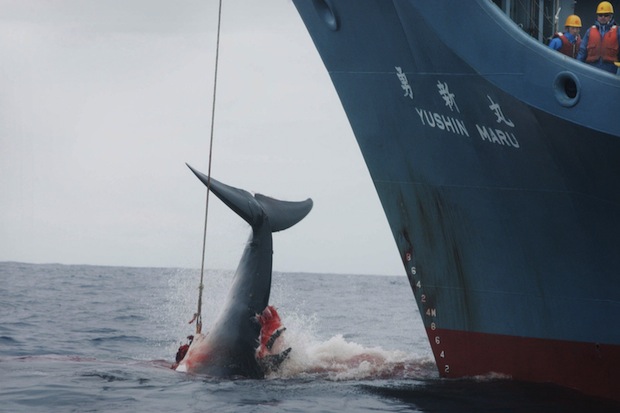Despite the recent ruling on March 31st by the International Court of Justice that Japan must stop “scientific” whaling and the government’s initial announcement that it would abide by the ruling, now comes the news that Japan’s Institute of Cetacean Research filed briefs at the end of last week in the US District Court in Seattle saying it intends to resume whale hunting in the Southern Ocean as early as fiscal 2015.
Japan previously responded to the court ruling by saying it would abide by the decision but added it “regrets and is deeply disappointed by the decision”.
Some saw the way the government responded to the result of the lawsuit first launched by Australia several years ago as a way of keeping its integrity — not caving in to the anti-whalers — while finding a exit plan for its loss-making whaling program.
However, this has been thrown to the wind now since the Japanese government plans to resume whaling as soon as the fiscal year in 2015. It will adjust its “research” program, such as by reducing the number of whales it will hunt.

The anti-whaling group Sea Shepherd — locked in a legal dispute with Japan over whaling and in a physical dispute every whaling season — has deplored the new development after the ICJ ruled against Japan. The ICR has said that the new program will not run counter to the ICJ’s finding, since that affects only the whaling in Antarctic waters.
Japan’s whaling is a gross example of tatemae — holding face and officially abiding with he 1986 moratorium to which the nation signed up. Other countries like Norway and Iceland rejected that decision and continued whaling commercially. But Japan instead resumed whaling simply under another guise of “scientific research”, saying it was catching whales to prove that their numbers were sustainable. The loophole has allowed Japan to continue whale hunting through the government-backed ICR and then sell the meat commercially. However, whale meat is no longer popular in Japan and due to the scale and age of the fleet, coupled with the tenacious resistance offered in the ocean by Sea Shepherd, whaling costs Japan much more than the sales the haul bring.
“The myth that this hunt was in any way scientific can now be dismissed once and for all,” said Greenpeace upon the recent ICJ decision.
The irony is that current methods of whaling were introduced to Japan by the West and that one of the primary objectives for Commodore Perry’s famous Black Ships arriving in Japan in the mid-nineteenth century to demand it begin trading with foreign states was so that America could take advantage of the rich whaling waters to the north of the archipelago. (Whales were a big source of oil at the time.)
Whether you agree that whaling should be banned or not, it seems much more logical if Japan just abandons the pretense of the science and follows the examples of the Scandinavians in openly whaling for cultural reasons. (Japan has a long history of hunting whale and dolphin meat, though traditionally it was coastal whaling.)
We feel that Sea Shepherd and other militant environmentalist groups target Japan for racist reasons while mostly ignoring the European whalers (when was the last time you heard of someone ramming a Norwegian whaling boat?). However, that aside, the perceived duplicity of the “science” and “research” only further aggravates the situation. An honest commercial whale hunt would turn the clashes between Sea Shepherd and the Japanese fleet on the high seas into a less political one.
























